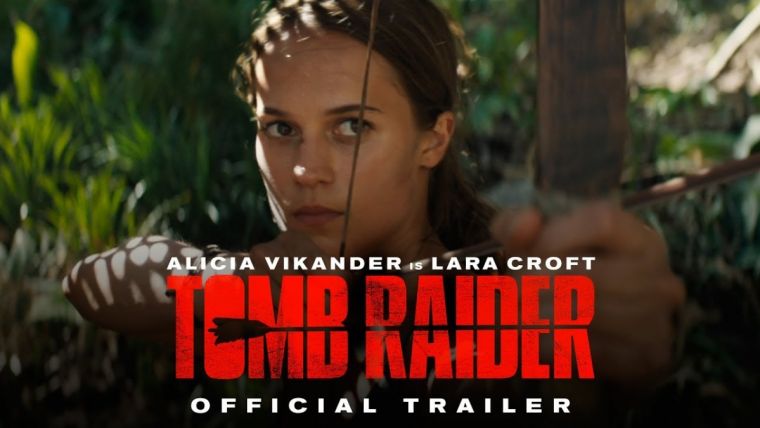Tomb Raider review: Searching for demons and an end to a long-running curse
Great video games usually make for lousy film adaptations. Despite numerous attempts, the film industry still hasn't managed to translate the thrill of beloved games into a great cinematic experience. In some cases, such as Bob Hoskins' infamous Super Mario Brothers movie, or the more recent Warcraft, the results are simply a very average film. In others – from Assassins Creed to Doom to umpteen Resident Evil – the adaptation is distinctly below-average. The two media – one participative, the other more passive – just don't appear to be complimentary.
The Tomb Raider series of games, which stretch back to the late 1990s, have already received two big-screen adaptations, with Angelina Jolie taking on the role of heiress adventurer Lara Croft. The first was among the better video game tie-ins; the second was a bit of a mess, and only appeared to reinforce the prevailing wisdom about game-originated movies. No-one was expecting or asking for that series to continue, let alone be completely rebooted. But, with Alicia Vikander in the lead and little-known Norwegian director Roar Uthaug at the helm, that's exactly what's happened. Tomb Raider is now in cinemas, and contains a significantly interesting theme for those of us with a passing interest in the supernatural. But can it possibly break the curse of the game-based movie?

Honestly, no. There's actually quite a lot to recommend about Tomb Raider; Vikander is a good actress and demonstrates some impressive athleticism as she's thrown around an action-packed story. Her Lara Croft seems extraordinarily resilient to pain, and her bones seem ridiculously strong, given the number of things she's sent crashing into as she leaps, falls and grunts through the film's globetrotting landscape. The frequent action sequences, all of them centring on (and punishing) Vikander, are intense and inventive, and as a result the movie is pacy and always visually interesting.
Yet that's precisely because the film still has a computer-game sensibility. Things move fast in order that the teenage target audience don't have a chance to get bored, but that also means the plot is little more than a stringing-together of that relentless action. Some sequences, such as an extraordinarily tedious puzzle-solving set-piece (and Vikander's incessant grunting), seem unnecessarily borrowed from the game in order to make it somehow feel like an authentic adaptation. Characters don't really develop, and the terrible, clunky script has them saying things that no actual humans ever would. "Remember, dad loves you" – the repeated catchphrase of Dominic West's long-lost Croft Senior, is a line so bad you find your toes involuntarily curling every time he utters it (and he says it a lot).
There are also some plot holes so big that even Lara Croft couldn't leap across them. One, which I won't reveal, concerning the film's unnecessary late twist, is presumably designed to set up further movies in the franchise and makes about as much sense as an armed schoolteacher. Yet I have to get this one off my chest: at one point Lara enters her father's secret study, untouched for seven years. She finds – lying casually on the side – a camcorder (which were still big in 2011?) and a dictaphone. Both work perfectly without so much as a power cable after all those dormant years, as if Lord Richard Croft's fortune was earned through the discovery of the everlasting battery. It sounds like a petty example, but it's the film's disregard for small details of reality which ultimately kills its credibility.
Thematically, the film appears quite interesting from a Christian perspective. The plot sees Lara following her father to a remote Japanese island, his last known destination, where he was looking for an ancient artefact which he believed to be demonic. Also in the hunt were a mysterious and shadowy organisation called Trinity, a sort of illuminati keeping watch on supernatural activity in the world, and Richard Croft was determined to keep it out of their clutches. The characters in the film therefore have something of a theological outlook, and seem to believe that demonic power is stronger than anything else. Yet this isn't a particularly Christian film, and there are plenty of voices on hand to debunk Lord Croft's spiritual ideas.
There's no point suggesting that Tomb Raider is a work of enormous depth of course. If it has any profound value, it's in its presentation of a heroine for teenagers who is strong, resilient and refreshingly unobjectified (although even still, the film only just scrapes through the famous Bechdel test). Despite its 12A age rating it is far too scary for children below that age – and possibly for some above it. The film offers pacy fun, some stunning visuals and an extraordinary array of grunts (did I mention the grunting enough? Honestly, it's like the Wimbledon ladies final at times). Really though, it looks a lot like someone playing a video game, and there in a nutshell is the rub; computer games are just much more fun to play than watch.
Martin Saunders is a Contributing Editor for Christian Today and the Deputy CEO of Youthscape. Follow him on Twitter @martinsaunders.











